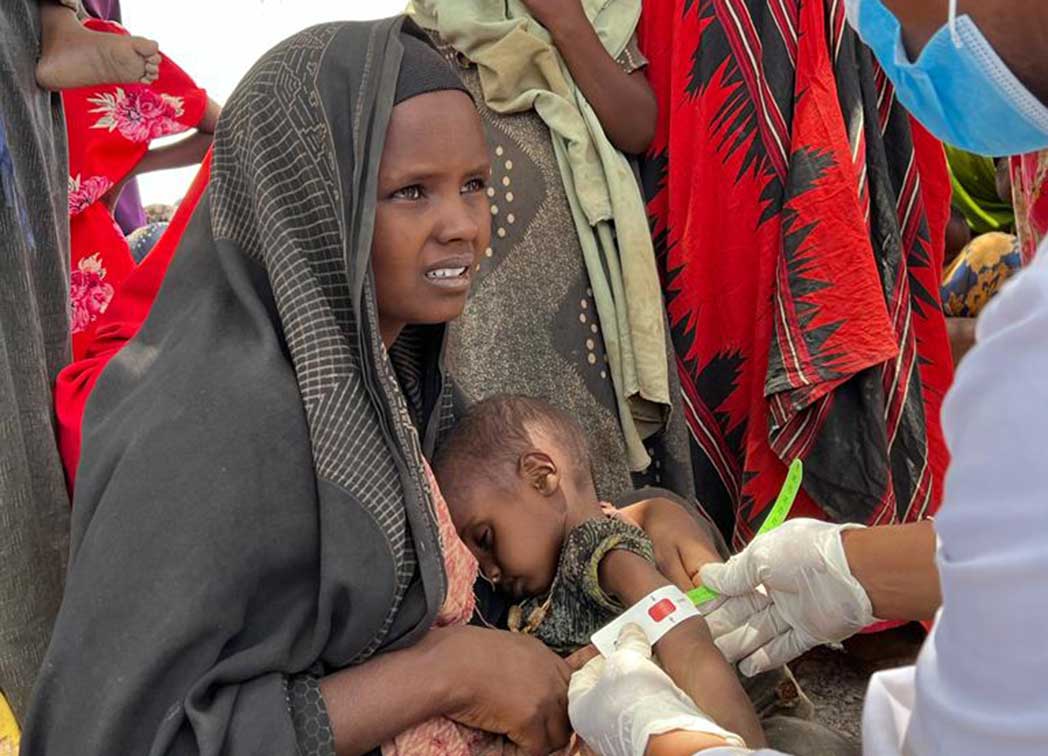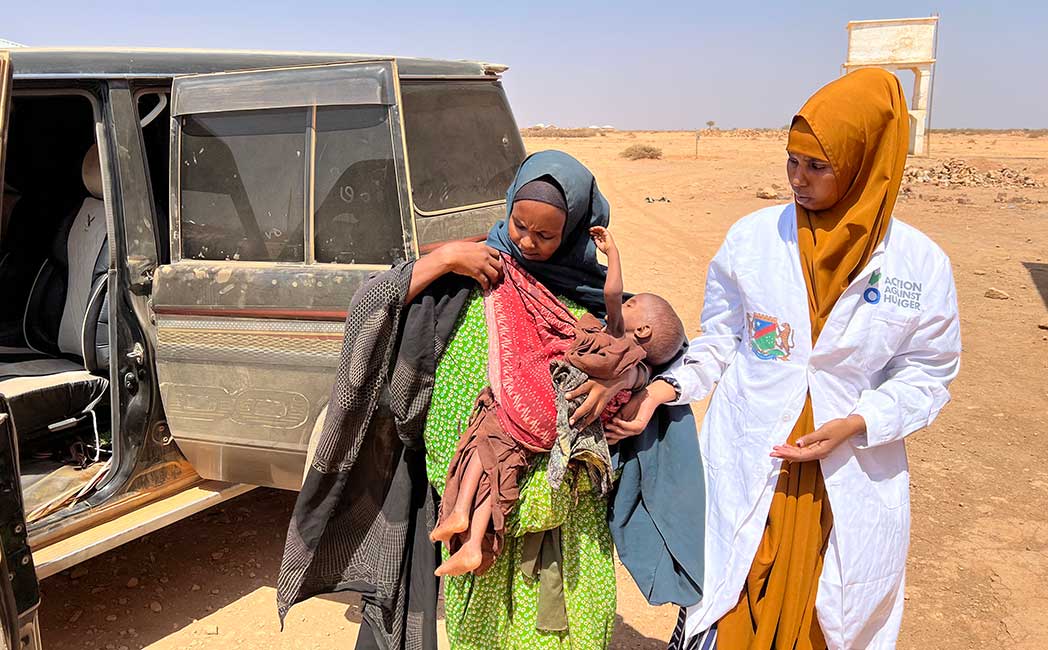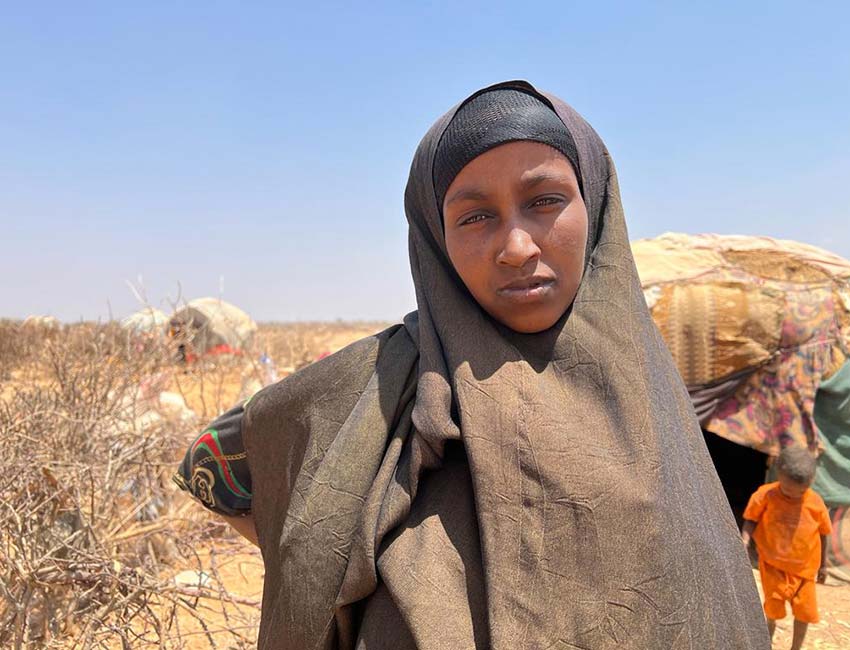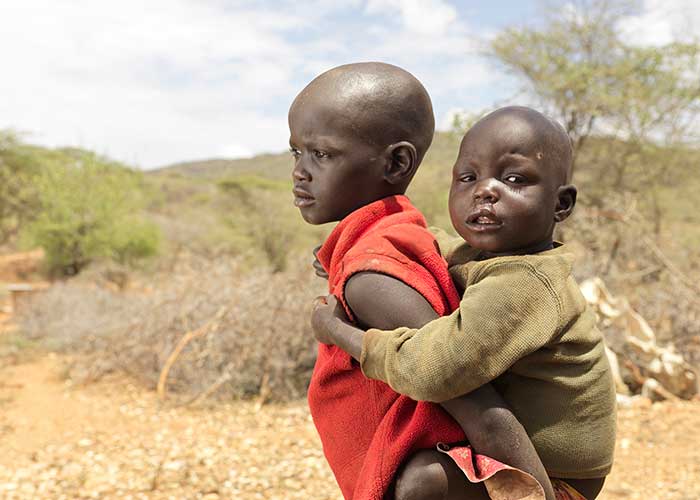Mumina has no milk left to breastfeed her youngest daughter, who’s just five months old. “What can I give her?” asks the 29-year-old mother of three children under six.
In southwest Somalia, severe drought, extremely limited access to clean water and poor health services have left many mothers in situations just like Mumina’s. In herding communities and displacement camps for those forced to flee their homes, food shortages are becoming more common.
Last year, Mumina, a widow, lost her goats and donkey – the family’s source of income and food – to drought. Desperate for food and a new livelihood to support herself and her children, Mumina left her home and walked more than 11 miles to the nearest displacement camp. She was four months pregnant at the time. Mumina’s cousin urged to come to the camp before she gave birth so she could access healthcare and a safe place to deliver her baby.
On their journey, Mumina’s 18-month-old son wasn’t able to walk for long. She was forced to stop and wait on the side of the road, hoping to catch a ride. Thankfully, a man on a motorbike stopped and offered to take them the rest of the way.
“I cried to the man and my children were also crying. He allowed us to squeeze next to an empty plastic barrel on the motorcycle,” she says. They arrived after dark and stayed with her cousin for the night before seeking shelter at the displacement camp.
Life at the camp hasn’t been easy. There are severe food shortages and many families in similar circumstances. Most people in the camp are women and their children. The few families with a male figure present have more options for income and other resources as the men seek work at the town nearby. Severe malnutrition is common among young children and most people depend entirely on support from Action Against Hunger and other organisations.
Drought exacerbates the hunger crisis in Somalia
After another rainy season failed, the drought in Somalia has intensified in 2022. Water wells have dried up and more people have been fleeing rural areas to seek aid in major towns.
We’re trucking clean water to towns, villages, and displacement camps throughout southwest Somalia. For families in displacement camps, we’re also providing hygiene kits to help fend off disease outbreaks. But our mobile teams have seen that dwindling food supplies are still causing increases in malnutrition among children.
“I don’t want my child to starve,” says Mumina, who worries for her own children and those of her fellow displaced mothers. Her neighbour, Aftin, saw her two-year-old child fall critically ill with malnutrition. “My neighbour’s child’s condition worries me a lot, which is why I sold the only bucket we had for £1.20 to buy food.”
Aftin’s husband fled the camp after he couldn’t find food to feed his children or work to support his family. Aftin, who was pregnant, watched feeling helpless as her child’s health deteriorated. Her son had a fever, diarrhoea and vomited frequently. His grandmother gave Aftin all the sugar she had – there was no other food. Aftin made a solution of sugar and water and gave it to her child.
“I didn’t know what to do. I gave him the sugary water, which he took,” says Aftin.
Action Against Hunger’s mobile team, which travels to villages and displacement camps to help monitor health and nutrition and provide healthcare, met Aftin and her son, and immediately found that he had malnutrition. He was severely underweight and had a fever.
Aftin was given medication to manage the fever, but her son wouldn’t eat the ready-to-use therapeutic food – the special peanut paste that can bring a malnourished child back to full health – so our teams helped them get to our health centre, where the little boy could receive inpatient treatment.

Rising food and fuel prices
It’s not just food prices that are rising – fuel is more expensive too. People who ride motorcycles to get water in rural areas are faced with an impossible choice: abandon their livestock and livelihoods and let the remaining animals weaken further and die or incur further debts to transport water to and from far-flung villages to support themselves and their herds.
Ahmed Malim Isak and Jele Ali Gedi co-own and operate a motorbike. Most of their customers are herders, who have no money to pay for rides during the drought, so the two men have not been able to buy fuel. Two days ago, they arrived in El Barde, the major town that is more than 15 miles from their home village, and since then, they have been stranded – unable to afford the gas needed to return home.
Most herders have got loans to pay for food for themselves and their animals on promises to pay when the drought subsides. In one community, a group of 15 livestock owners have borrowed more than [£5,500] and plan to pay when the rains come. “We will continue to ask if we can get the loans,” says Jelle Ali, an elder whose village receives cash assistance and water ferrying services from Action Against Hunger.
Action Against Hunger is providing nearly 2,000 vulnerable families in the area – including Aftin and Mumina – with cash transfers of over £50 per month for three months to help them cope. The money will help them buy basic goods and mitigate the effects of the drought.
Water and food are precious commodities in a drought. The infusion of emergency assistance – water imported by trucks and cash transfers – help families in the short-term, but they are expensive interventions that are difficult to sustain, especially as the number of people in need grow.
For mothers like Mumina, these are truly difficult times.



